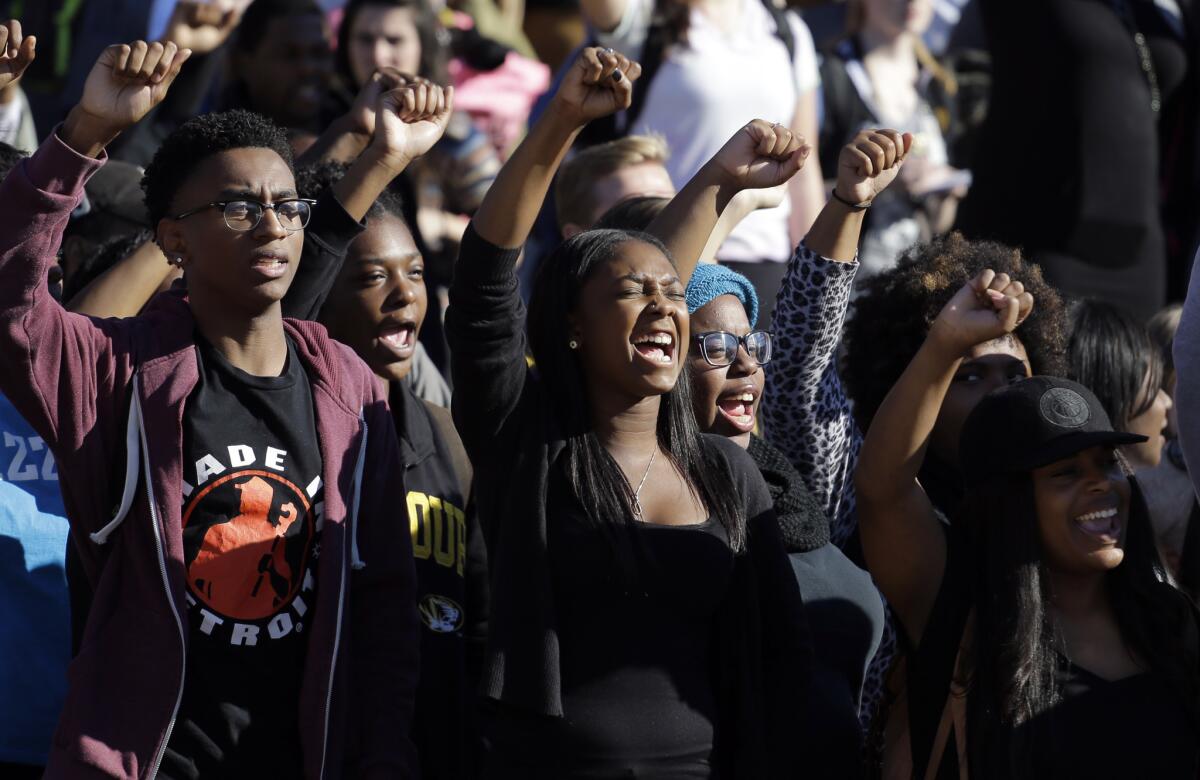Op-Ed: Take a cue from Ralph Ellison: Don’t demean minority students by overprotecting them

Students cheer following the announcement that University of Missouri System President Tim Wolfe would resign on Nov. 9, 2015.
In a 1967 interview, the African American novelist Ralph Ellison denounced the commonplace idea that blacks had been permanently “damaged” by slavery, segregation and institutional racism. Instead, Ellison insisted, blacks’ survival in the face of discrimination and hatred demonstrated their strength and character.
“Any people who could endure all of that brutalization and keep together, who could undergo such dismemberment and resuscitate itself ... is obviously more than the sum of its brutalization,” Ellison said. “I am not denying the negative things which have happened to us and which continue to happen, but I am compelled to reject all condescending, narrowly paternalistic interpretations of Negro American life and personality from whatever quarters they come, whether white or Negro.”
Ellison would be appalled by our current moment on American campuses, where the damage thesis has returned with a vengeance. From Yale University and Ithaca College to the University of Missouri and Claremont McKenna College, black students and their allies are claiming that racist behavior — and administrators’ weak response to it — are harming minorities’ psychological health. They insist that overtly racist comments as well as “microaggressions” — smaller, day-to-day slights — take a psychic toll.
“I have friends who are not going to class, who are not doing their homework, who are losing sleep, who are skipping meals, and who are having breakdowns,” wrote one student at Yale, where a professor’s email about Halloween costumes triggered protests.
I don’t doubt that African American students — and other minorities at our colleges — experience routine prejudice and discrimination. We live in a society that is riven by racial stereotypes, distortions and fantasies. As much as I’d like our campuses to be immune from all of that, I know that they are not.
Nevertheless, I’m troubled by the psychological idioms our students are using to describe racism, which echo the same paternalism and condescension that Ellison decried. Equally troubling is the much-heard argument that everyone on campus should “validate” minorities’ experience and yield to their demands, lest we harm fragile psyches even further.
Starting in the early 1900s, white social scientists — and, eventually, some black ones — insisted that African American minds had been permanently scarred by racism. Their influence was particularly prominent in the landmark 1954 Brown vs. Board of Education decision, which declared that segregating black children “generates a feeling of inferiority ... that may affect their hearts and minds in a way unlikely ever to be undone.”
If you took away every racist insult at Yale, most blacks in America would still lack the opportunity to go there or to other elite colleges.
Yet there was little evidence that black kids in segregated schools felt worse about themselves. In fact, Kenneth and Mamie Clark’s famous doll experiments — which were cited in the Brown decision — showed that African American students in integrated schools were more likely to choose a white doll rather than a black one, which the Clarks took as a sign of low self-esteem.
Subsequent studies would cast doubt on the idea that African Americans, whatever their circumstances, suffered from low self-esteem. Jason W. Osborne and other psychologists showed in the 1990s that African Americans often scored higher on self-esteem measures than did their white counterparts.
Segregation, whether state-sponsored or de facto, is an abomination, but not because it hurts feelings. It’s an abomination because it hurts opportunity, shunting black children into sub-standard schools.
Those kinds of structural factors often get buried or lost when the talk turns to psychology, which reduces everything to a matter of emotion. If you took away every racist insult at Yale, most blacks in America would still lack the opportunity to go there or to other elite colleges. The uproar about offensive Halloween costumes (and emails about offensive costumes) is a distraction from the cruel racial disparities still very much at play in our society.
And who can measure feelings, like anger and humiliation? Unlike structural inequalities, which you can document with data, emotions are by definition subjective. They become trump cards, no matter what other facts are in evidence.
At Claremont McKenna College, a dean resigned after student protests over an email she wrote expressing concerns about nonwhite students who did not “fit our CMC mold.” It’s absurd to suggest that the dean thought all students should fit a “white” mold; indeed, she wrote the email to challenge precisely that proposition. But the students felt hurt by her choice of words, and that was enough.
If we let ourselves be governed by feelings, we’ll go down a rabbit hole of competing grievances and recriminations. The question will no longer be who is right or wrong or what’s most worth rectifying — in any objective, demonstrable sense — but who is experiencing the most pain and trauma.
In the process, we’ll demean minority students in the name of protection. As Ralph Ellison reminded us nearly half a century ago, the idea of damaged black minds condescends to people who are much stronger than the accumulated slights they have suffered. I support the minority students standing up to the racism that still surrounds them. But I won’t patronize them by “validating” everything they say simply because they feel it. Neither should you.
Jonathan Zimmerman teaches history and education at New York University. He is the author of “Too Hot to Handle: A Global History of Sex Education.”
Follow the Opinion section on Twitter @latimesopinion and Facebook
More to Read
A cure for the common opinion
Get thought-provoking perspectives with our weekly newsletter.
You may occasionally receive promotional content from the Los Angeles Times.










